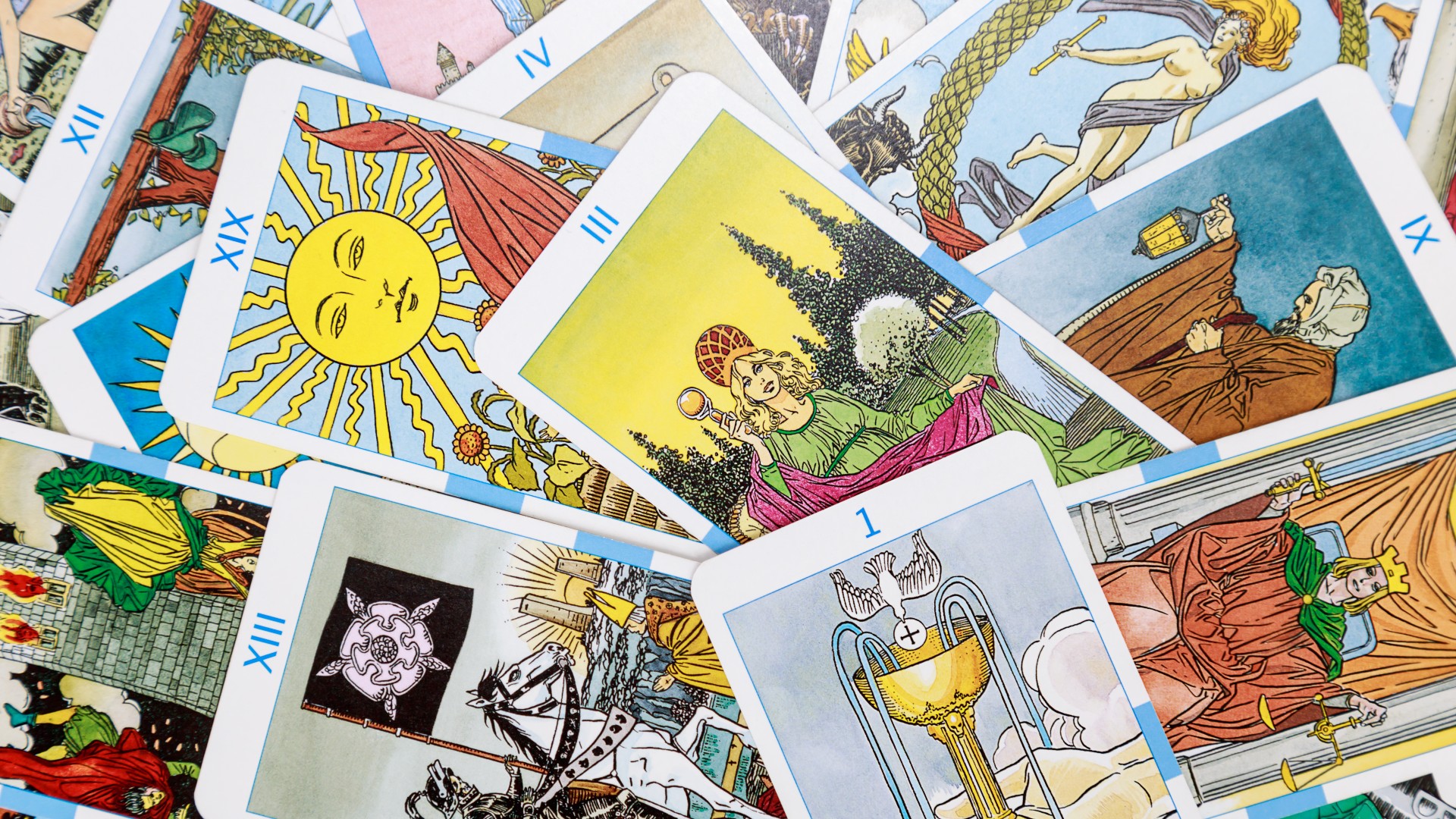
There are several ways of reading tarot cards. Cartomancy refers to "reading with the card". This is the first method. A tarot reader asks questions and draws the cards to answer them. This method is used to gain insight by psychics or astrologers.
Tarot card reading strategies
There are many methods to read tarot decks. Each has its own advantages. To begin with, it is important to keep your mind open and not be influenced by any biases. To assist with interpretation, you may also want to consult a guide. As you develop your own way of reading, you'll begin to see patterns in the meanings of the cards and begin to identify common stories within the major and minor arcana.

You can read tarot card cards by first shuffle your deck and then flip it over so that the correct side is facing you. Spreads are a collection of cards that tell a story. You will get more depth reading the more cards are you combine. This method is not for everyone.
Major arcana
Many people have a different way of reading the Major Arcana when reading tarot cards. Some readers choose to pull cards without a specific order, while others set an intention for each card's meaning. Some readers consider where the Major Arcana Cards are located. A Fool in the future actions section could indicate that there are changes needed.
Major Arcana cards often reflect life's lessons and themes. They can also help you understand your karmic influences. They can have a profound impact on your life and are extremely important. They have complex and deep meanings. They provide many key lessons and the structure of consciousness.
Reversals
You've probably noticed that when you're reading tarot cards, you're often seeing reversals. It is an odd phenomenon and can make it difficult to know if you are correct in your interpretation of the tarot. There are several ways to interpret reversed cards correctly.

You can interpret reversals accurately by thinking of them as the reverse of the upright position. The upside is that reversals can point to either an energetic activity or an inactive state. This can help to determine the meaning of a particular card.
FAQ
What is the cost of a hobby?
It costs nothing to start a hobby. It can take many years to accomplish what you desire if you are serious about it.
There is one thing that will help you. It's called "passion." If you are passionate about what you do, it will be easier to work hard and make progress.
You may become addicted to the activity once you have put in enough hours. Here is the fun part! Because you now enjoy what you do and are improving your skills every day. You will likely have seen a significant improvement by the end the year.
Do not worry about the time it takes. Don't be afraid to try. You may be surprised!
How can I find a hobby?
When you first start your journey into finding a hobby, you may feel like you've got nothing to choose from.
You might be thinking "I'm not very creative" or "I am terrible at sports" or even "I don’t know anything”.
There is a good chance that you have some experience with hobbies.
It's just not something you're aware of.
Take a look at the contents of your home. What amount of stuff do you have?
Are there any toys that you don't use anymore?
Maybe you have a collection of books or magazines.
Maybe you've always wanted to learn how to cook.
Perhaps you would like to play guitar again.
Whatever it is, there's likely something you can turn into a hobby.
Realize that you have many experiences already.
You will find a hobby you love once you have it.
What are some competitive hobbies?
Swimming, running, cycling, golfing and tennis are some of the competitive sports.
They are usually enjoyed by people who enjoy being active, but also allow for social interaction.
If you have a hobby that involves physical activity, then you'll probably find that there are other people around who share this interest.
This may mean joining a club or group where you meet regularly to play sports together.
You could also opt to take part in team games that involve playing alongside others.
These include cricket, football, netball, hockey, netball, soccer, rugby, cricket, rugby, batsball, hockey, volleyball, badminton squash, handball and table tennis.
There are many kinds of competition.
Some competitions can be used for only recreational purposes.
Others are designed to test the skill of competitors.
Yet, there are others that reward exceptional performance.
In these cases, winners receive prizes.
Other competitions are intended to test strength and stamina.
These are called endurance events.
For example, marathon races, triathlons, Ironman Triathlon, etc.
Before competing in these events, athletes train hard.
They will adhere to a strict training program that prepares them mentally as well as physically.
They might also have to travel for preparation.
It is important to keep in mind that not all athletes can compete in every event.
What can I do to make money from my hobby or business?
You can have many hobbies that lead to extra income.
If you're passionate enough about your hobby, you may decide to sell items related to it.
If you're a collector of stamps, you may be interested in establishing a website to sell them.
You can also make extra income by selling and buying stamps.
Another option is to set up a YouTube channel that focuses on your hobby.
This allows you share your passion and generate revenue by creating premium content.
Which hobbies are most in demand right now?
Popularity isn’t always a positive thing. It can be used to justify mediocrity. Many people have no time for hobbies or other interests. They're too busy working to make ends met. What should you do when you don't have much time? You could open a business.
However, this isn't easy. You will need to overcome many obstacles before your idea can become a reality.
Consider pursuing a hobby if your goal is to have something more fun than running a company.
Hobbies aren't just limited to creative pursuits. There are many different kinds of hobbies available. Some of these include:
-
Gardening
-
Cooking
-
Photography
-
Reading
What are educational hobbies, you ask?
An educational hobby is a activity that allows you to learn by doing it. You could choose to learn how to play an instrument or play sports.
It should be enjoyable and fun for you. While you don't need to do it every day, if bored you might consider other activities.
These activities could end up costing you far more than what you pay for.
What are some good hobby ideas?
Hobby Ideas for People who Love to Learn and Teach Others.
Hobbies are a great way for you to do what you love and also learn something new.
Although there are many hobbies to choose from, they all share some common characteristics. They're often fun and easy to do.
These include working with others to teach someone how to use an instrument or build an airplane.
You may not think of yourself as a teacher but there might be something you could do in order to help someone else learn.
If you are looking to become more creative in your daily life, you might consider starting a hobby that allows you to share your talents with others.
Statistics
- 37% Video Games 36% Travel 36% Health and Fitness (quizexpo.com)
- Almost 80% of people claim to have no hobby. (hobbylark.com)
- Studies show that just six minutes of reading can reduce stress levels by 60 percent. (oberlo.com)
- The intensity of the dialogue partners' bond at the end of the forty-five-minute vulnerability interaction was rated as closer than the closest relationship in the lives of 30 percent of similar students. (time.com)
- A new survey by Pew Research Center of teens ages 13 to 17 finds that 36% of girls feel tense or nervous about their day every day; 23% of boys say the same. (pewresearch.org)
External Links
How To
How to Learn a Musical Instrument
If you want to learn how to play music, there are many ways to do so. You could attend a school, read a book, get lessons from someone who plays a musical instrument, or look at videos online. Here are some tips and techniques to help you learn if your goal is to create your own learning path.
-
Find something you are interested in. You don't have to like every instrument you see. It is difficult to enjoy an instrument if it is not something you are interested in.
-
Be patient. Learning something new takes time. Don't expect to master everything right away. Instead, keep practicing every day.
-
Regular practice is important. You can do this even when it is hard. This will ensure that you won't forget what you learned.
-
You should choose a comfortable place to practice. A quiet room where you won't disturb anyone else is ideal. Be sure to not distract others. You should avoid loud music being played near you.
-
Have fun. Music should be enjoyed. Have fun with your practice. It will make you more motivated to keep going.
-
Set goals. Set goals. You'll know exactly what you must achieve. You will never be ashamed to fail.
-
Keep track and keep track of your progress. Keep track of all your successes and failures. You will be able to improve your skills over time by writing down all of your achievements and failures.
-
Take breaks. Sometimes all it takes is to take a breather. Take breaks to allow you to reflect on things.
-
Ask questions. Ask others if there are any doubts or questions regarding the instrument. They may be able help you.
-
Learn by listening. Many musicians enjoy listening to their favorite songs and trying to imitate them. This allows them to understand the basic ideas behind the song.
-
Read books. You will learn more from reading books than you can by watching videos or attending classes. Books also contain information that you cannot find elsewhere.
-
Join a group. You will be able to practice more when you play with others. Plus, it will be easier to meet people with similar interests.
-
Learn from tutorials. Tutorials are short videos that explain various topics in great detail. Tutorials are short videos that focus on one part of the instrument. Tutorials can be helpful in understanding difficult parts of an instrument.
-
Try different methods. Some people prefer to learn via lectures while others prefer to read. Keep trying until you find your preferred method.
-
Practice makes perfect. Nobody becomes an expert overnight. It takes a lot of work to be able to perform well.
-
Get along with other musicians. Listening to others play your favorite songs can help speed up learning.